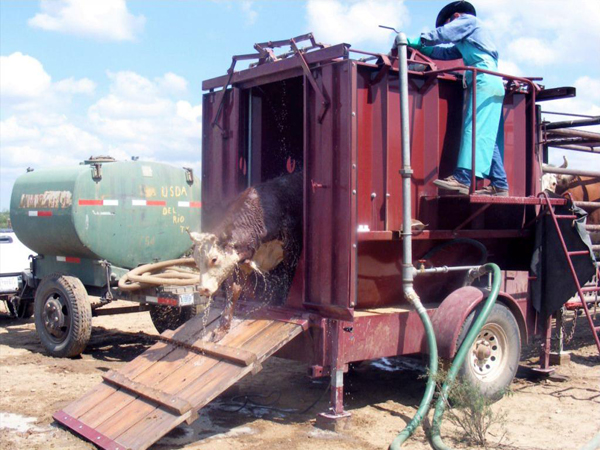- La Feria Community Holds Succesful Business Mixer Event
- Little Nashville to Take Place in Downtown Mercedes
- Lions Basketball Captures District Gold
- La Feria ISD Students Compete in Regional Chess Tournament
- Lions End First Half of 32-4A on a High Note
- La Feria ISD Held Another Successful Parent Conference
- Strong Appearance for Lions at Hidalgo Power Meet
- LFECHS Students Get to Meet Local Actress
- Students Participate in Marine Biology Camp
- Two LFECHS Students Qualify for All-State Band
Ranchers Hindered in Efforts to Combat Cattle Fever Ticks
- Updated: August 10, 2018
Texas Farm Bureau asks state agency to reconsider its actions
(WACO, Texas)—Texas Farm Bureau (TFB) is disappointed in actions taken this week by the Texas Department of Agriculture that stopped the use of cattle spray boxes for the treatment of cattle fever ticks in South Texas.
The state’s largest general farm organization supports the efforts of the Texas Animal Health Commission (TAHC) and the United States Department of Agriculture (USDA) Animal and Plant Health Inspection Service (APHIS) in their role to combat invasive cattle fever ticks.
“Removal of this tool has jeopardized the health of the Texas cattle herd and the viability of farmers and ranchers,” TFB President Russell Boening, a farmer and rancher from Poth, said. “The cattle fever tick, and the disease it carries, has the capability to cripple the Texas cattle industry if it is not contained.”
TFB asks the Texas Department of Agriculture to reconsider its actions. Experts in fever tick eradication and animal well-being should be allowed to use all tools approved in the fight to control cattle fever ticks.
Boening noted consumers can be assured that farmers, ranchers and regulatory officials have the utmost consideration for animal health and well-being during and after treatment.
“The safety and wholesomeness of beef is not blemished by the use of this product,” he said.
Spray box operators are trained under the supervision of state and federal veterinary officials. The spray solution is sampled and tested for accurate and consistent active ingredient concentrations before treatment. This ensures correct application of the federally-approved insecticide.
“The mobile spray boxes have been approved for use by the Environmental Protection Agency for decades and offer real advantages over stationary dipping vats,” Boening said.
The spray boxes are an important tool in the eradication effort and are not known by TAHC or USDA officials to cause cattle death, he said.
The ticks are capable of carrying and transferring a disease commonly known as cattle fever, which can kill up to 90 percent of those infected.



